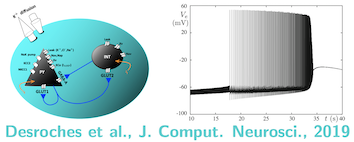MathNeuro Seminar (Zack Kilpatrick, Boulder)
Zachary P. Kilpatrick, PhD (Department of Applied Mathematics, University of Colorado Boulder, USA)
Title: Neuromechanics of working memory errors: a neural field approach Abstract: We develop and analyze neurocomputational models to account for systematic errors in visual working memory tasks. Our framework is a neural field model with lateral …

